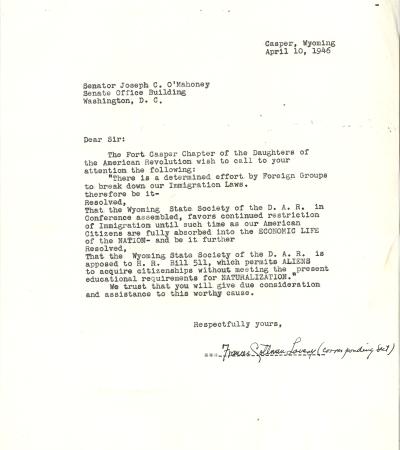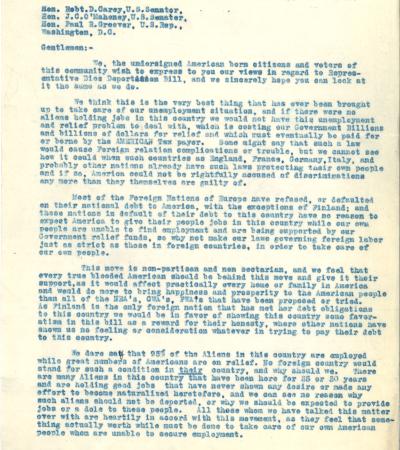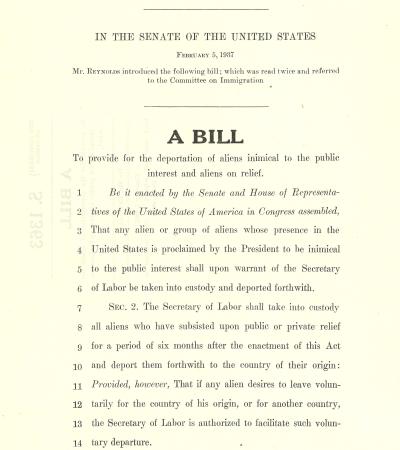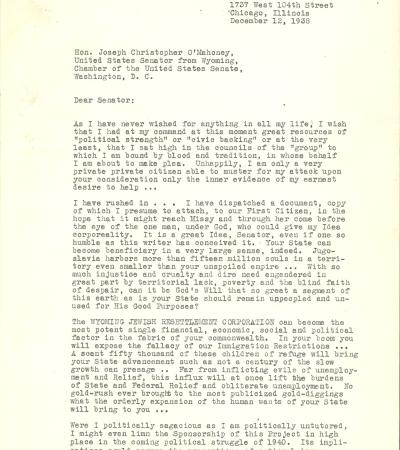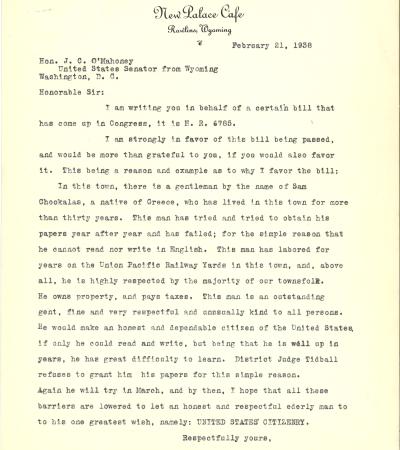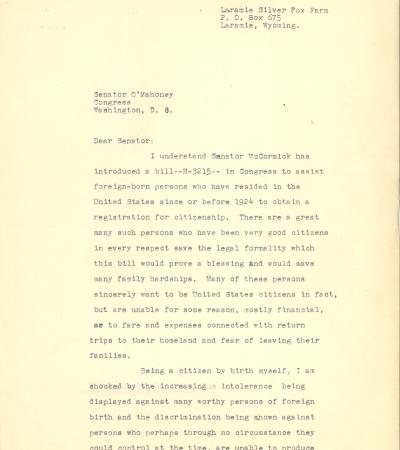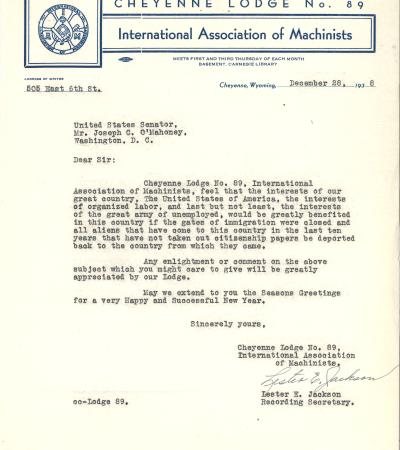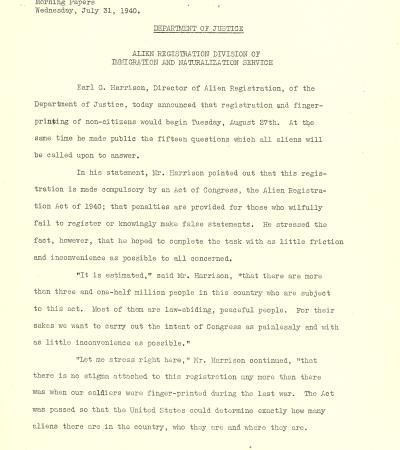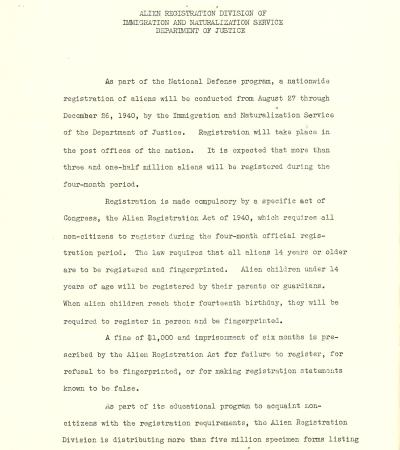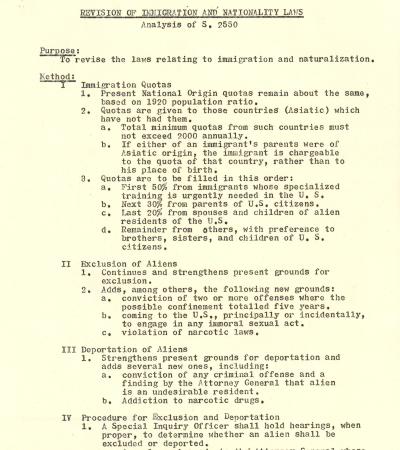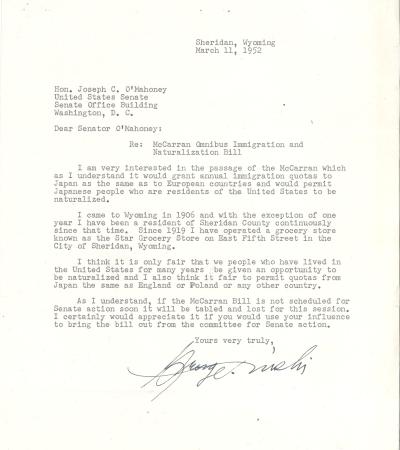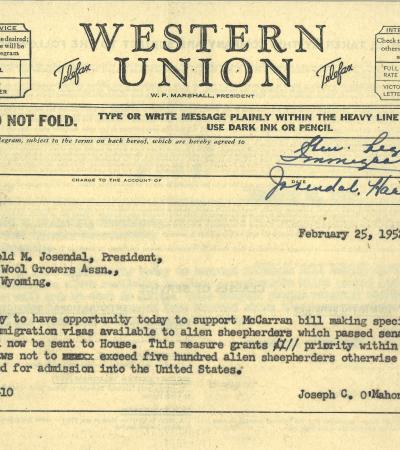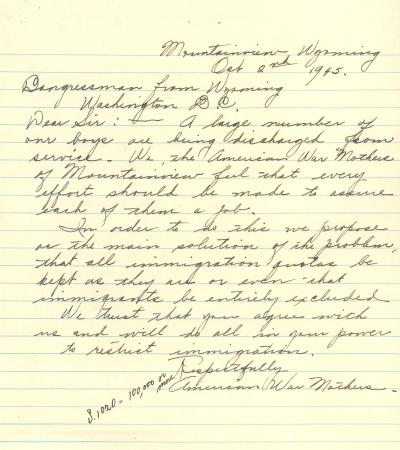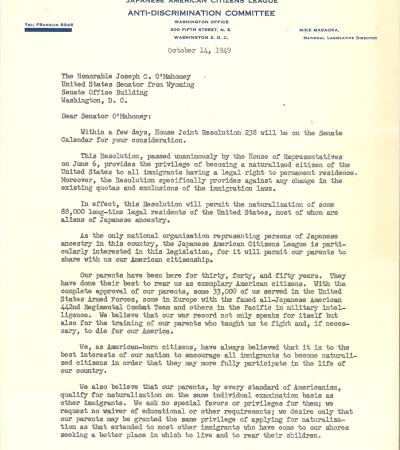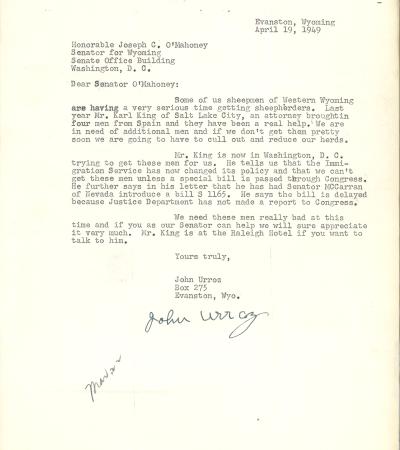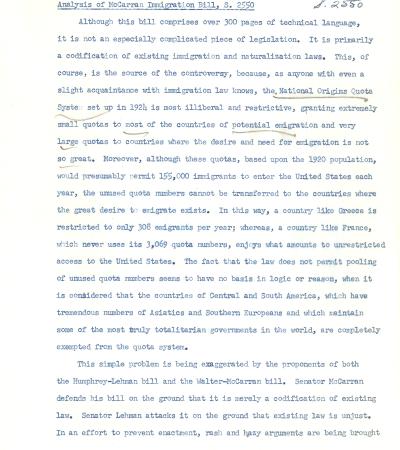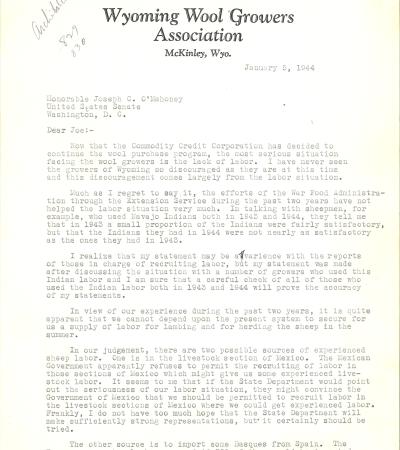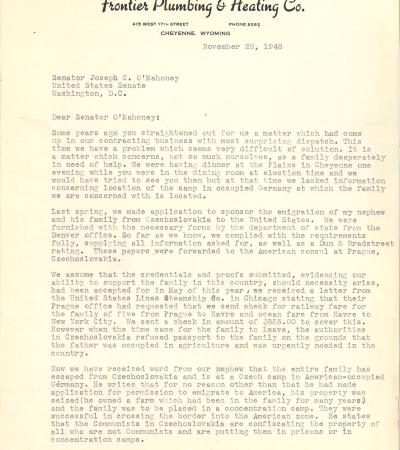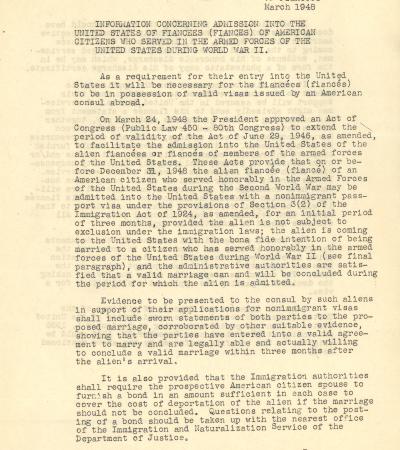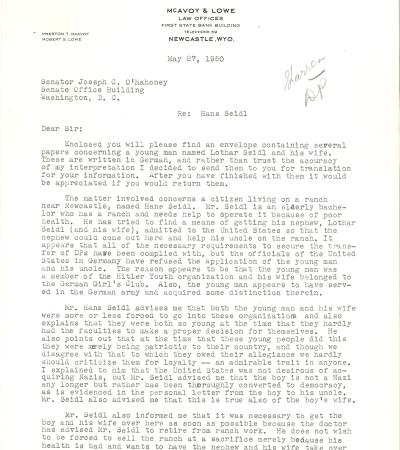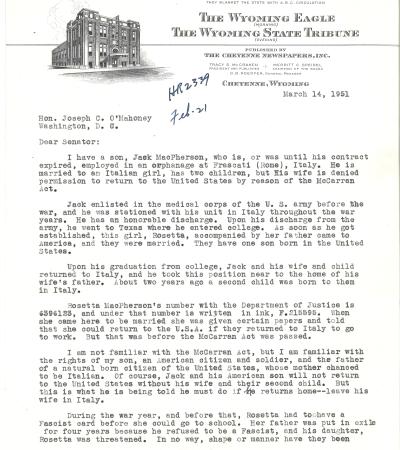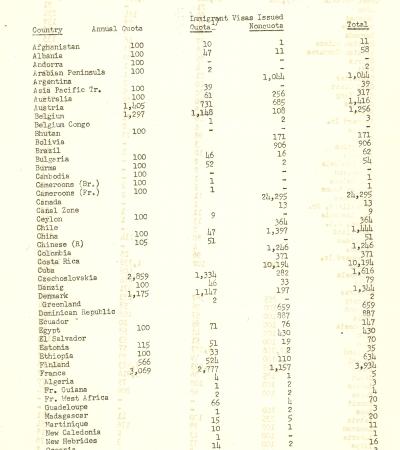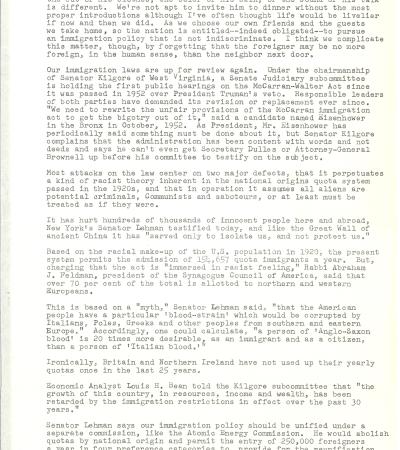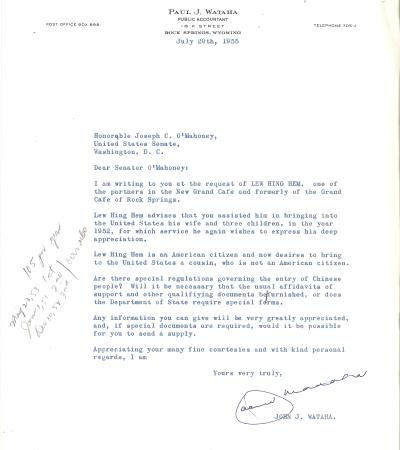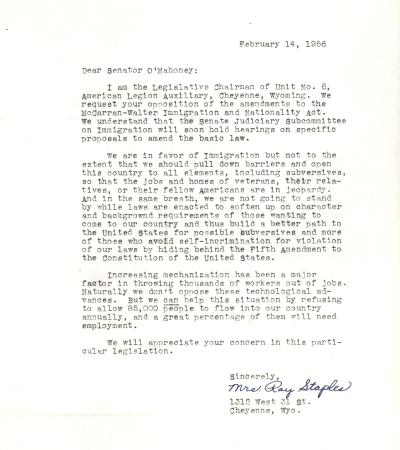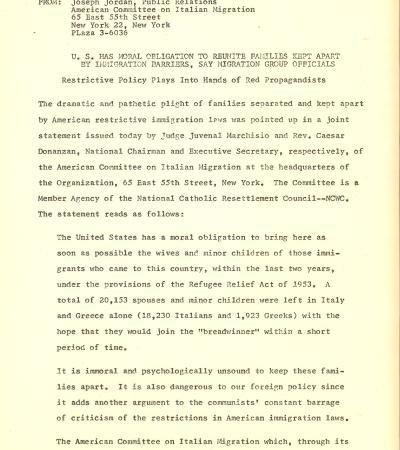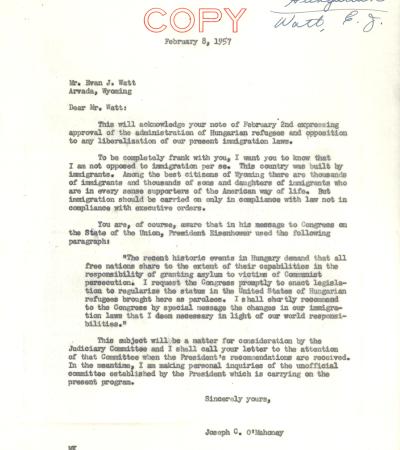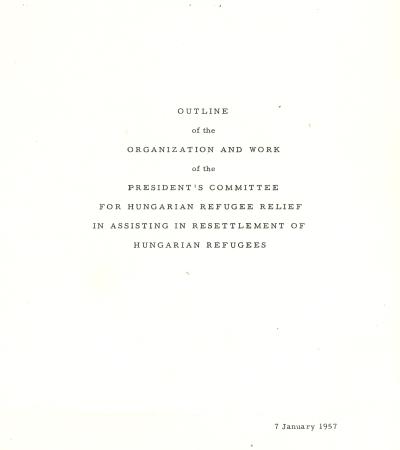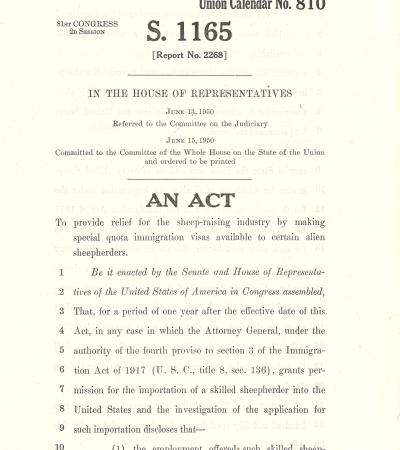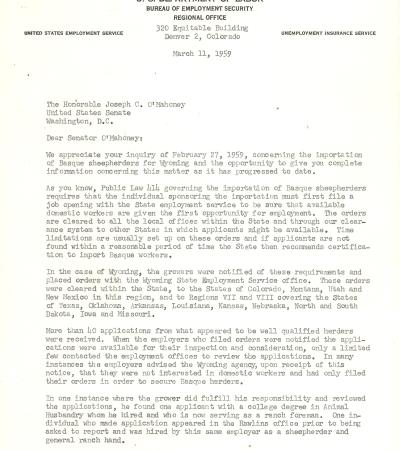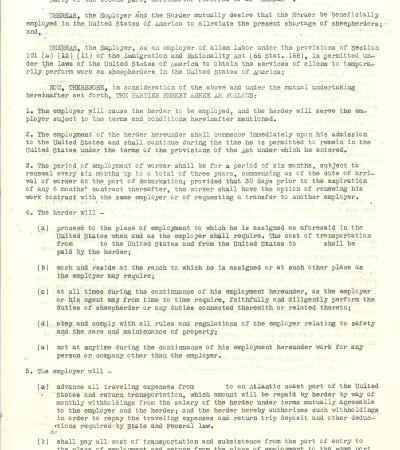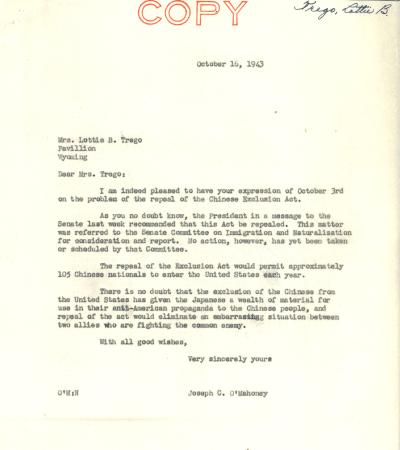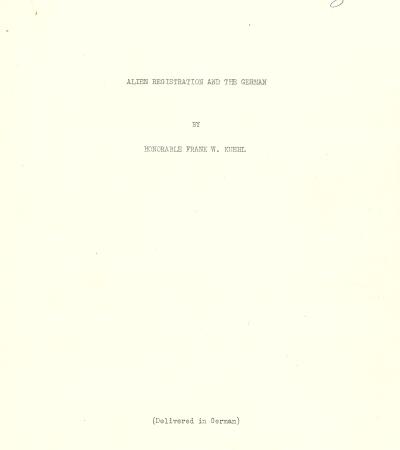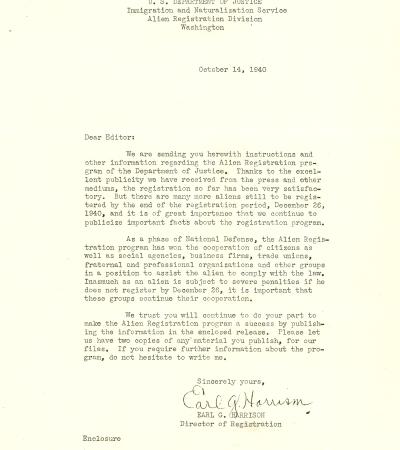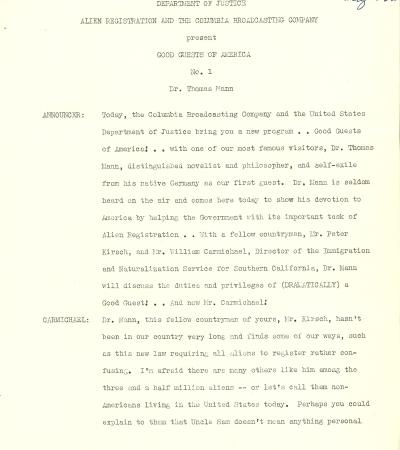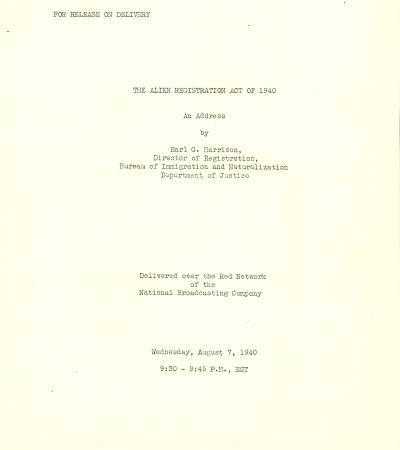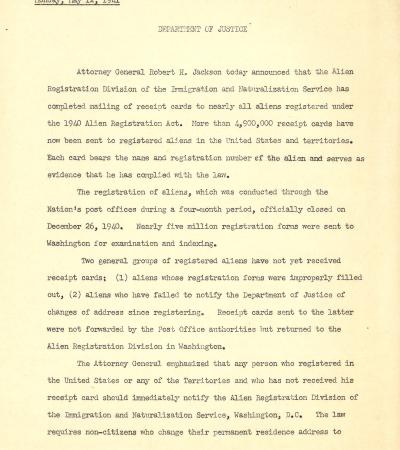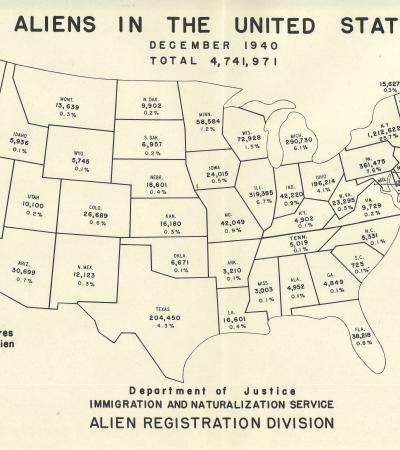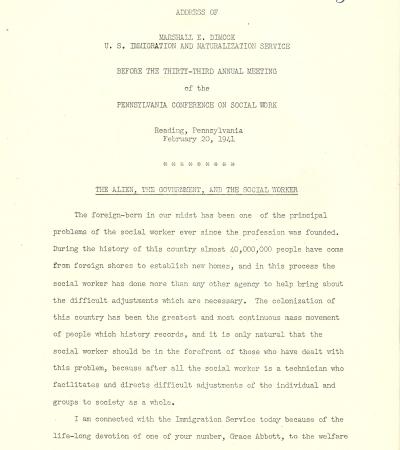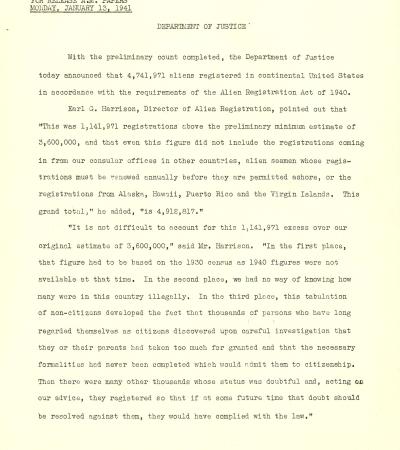Joseph C. O’Mahoney (1884-1962) was a Democrat politician who spent 25 years representing Wyoming in the U.S. Senate between 1933 and 1960. While O’Mahoney did not serve on the Senate Committee on Immigration and Naturalization, he took an active interest in immigration law. His papers include hundreds of letters from people requesting help with the process of immigrating to the U.S. or naturalizing as U.S. citizens as well as the text of various bills on immigration that were proposed in the Senate.
Correspondence between Senator Joseph C. O'Mahoney and Frances Lovery, April, 1946
Lovery, representing the Fort Casper Chapter of the Daughters of the American Revolution (DAR), writes O'Mahoney with concerns that foreign groups are attempting to break down U.S. immigration laws. DAR favors restriction of immigration.
Letter from Myron Allen and others to Senatory Joseph C. O'Mahoney, June 28, 1935
Allen and others from Aspentunnel, Wyoming write to O'Mahoney about the Dies Deportation Bill. Allen favors deporting aliens so that unemployed Americans can fill the jobs they vacate.
Senate Bill 1363, February 5, 1937
This bill, proposed in the U.S. Senate, provides for the deportation of aliens based on proclamation of the U.S. President and for the deportation of aliens subsisting on public or private relief.
Letter from Maxin Konecky to Senator Joseph C. O'Mahoney, December 28, 1938
Konecky writes to O'Mahoney about his idea for a Wyoming Jewish Resettlement Corporation. He attaches a copy of a letter written to President Franklin D. Roosevelt which elaborates on Konecky's proposal to settle Jews fleeing persecution in Europe in Wyoming and other Western states.
Letter from George P. Economy to Senator Joseph C. O'Mahoney, February 21, 1938
Economy, of Rawlins, Wyoming writes in support of an immigration bill being considered in the U.S. House of Representatives which will loosen immigration restrictions. He cites the specific case of a resident of Rawlins from Greece who has tried for 30 years to obtain papers to legalize his presence in the U.S., but has been unsuccessful because he cannot read and write in English.
Letter from Mrs. John Larsen to Senator Joseph C. O'Mahoney, 1939
Larsen, of Laramie, writes to O'Mahoney in support of House Bill 3215 which would allow foreign born people who have resided in the U.S. since before 1924 to obtain citizenship papers. She expresses concern about both the growing intolerance towards the foreign born and widespread opposition to immigration.
Correspondence between Senator Joseph C. O'Mahoney and Lester E. Jackson, December 28, 1938
Jackson, representing the Cheyenne Lodge of the International Association of Machinists, writes to O'Mahoney. He urges that immigration be stopped and that aliens without citizenship papers be deported.
Department of Justice Press Release, July 31, 1940
The press release announces the commencement of the Alien Registration and fingerprinting process under the Alien Registration Act of 1940. The statement emphasizes that the registration is intended to document non-citizens residing in the U.S., ensure national security, and protect law-abiding aliens.
"Alien Registration Division Of Immigration and Naturalization Service Department of Justice"
This memo outlines the nationwide alien registration process mandated by the Alien Registration Act of 1940, requiring all non-citizens to register and be fingerprinted between August 27 and December 26, 1940, as part of national defense efforts. It emphasizes that the process is intended for record-keeping and security purposes, and seeks public cooperation in facilitating registration.
Memo from the Senate Majority Policy Committee on Senate Bill 2550, May 9, 1952
The document covers proposed revisions to U.S. immigration and naturalization laws, which include maintaining national origin quotas, adding quotas for some Asian countries, and implementing stricter exclusion and deportation measures. While the bill aimed to address immigration inefficiencies, critics argued it retained outdated quotas, introduced vague deportation standards, and undermined judicial protections.
Correspondence between Senator Joseph C. O'Mahoney and George Nishi, March 1952
Nishi, of Sheridan, writes in support of the McCarran Omnibus Immigration and Naturalization Bill. He favors the bill, as it would help him become a naturalized citizen of the U.S.
Telegram from Senator Joseph C. O'Mahoney to Harold M. Josendal, February 25, 1952
O'Mahoney's message to Josendal, President of the Wyoming Wool Growers Association, informs him that the McCarran Bill which passed the Senate will allow 500 alien sheepherders to be admitted to the U.S.
Correspondence between Senator Joseph C. O'Mahoney and The American War Mothers, October 2, 1945
The Mountain View, Wyoming, branch of the American War Mothers writes of their concern that jobs will be scarce when their sons who are in the military return from World War II. The War Mothers propose that immigration quotas be maintained, or even that immigrants be prohibited from entering the U.S.
Letter from Mike Masaoka to Senator Joseph C. O'Mahoney, October 14, 1949
Masaoka, the Legislative Director of the Japanese American Citizen League Anti-Discrimination Committee, writes to O'Mahoney in support of House Joint Resolution 238. He points out that the resolution, should it become law, will permit the naturalization of some 88,000 long-time legal residents of the U.S., most of whom are aliens of Japanese ancestry.
Correspondence between Senator Joseph C. O'Mahoney and John Urroz, April 19, 1949
Urroz, a sheepman from Evanston, Wyoming, writes of his concern about his ability to hire Basque sheepherders. He requests help from O'Mahoney. O'Mahoney replies with his willingness to help expedite the passage of Senate Bill 1165 which would permit immigration of sheepherders from Spain.
Analysis of McCarran Immigration Bill, S. 2550, 1952
The document provides an analysis of the McCarran Immigration Bill (S. 2550), describing it as a codification of existing restrictive immigration laws while also introducing harsher provisions, such as rigid national origin quotas, stricter exclusion criteria, and broad discretionary powers for officials in visa denial and deportation.
Letter from J.B. Wilson to Senator Joseph C. O'Mahoney, January 5, 1944
Wilson writes on behalf of the Wyoming Wool Growers Association to O'Mahoney. Wilson advocates for immigration visas for experienced livestock workers from Mexico or Basque shepherds from Spain, while emphasizing the urgency of immediate action to prevent devastating impacts on the wool industry.
Correspondence between Senator Joseph C. O'Mahoney and John Slack, November 28, 1948
Slack writes O'Mahoney to request help with the immigration of his nephew and family who escaped Czechoslovakia after World War II. It is typical of the many letters received by O'Mahoney in ithe aftermath of the war.
"Information Concerning Admission into the United States of Fiancées of American Citizens, March 1948
The memo outlines the requirements for the admission of foreign fiancées and fiancés of American citizens who served honorably in the U.S. Armed Forces during World War II. It details visa eligibility, necessary documentation, financial assurances, and the legal conditions that must be met, including the requirement that marriage must occur within a three-month period after entry of the immigrant into the U.S.
Correspondence between Senator Joseph C. O'Mahoney and Robert S. Lowe, May 27, 1950
Lowe, representing Hans Seidl, writes to ask for O'Mahoney's help with the immigration of Seidl's relatives who are German. The question of their ability to qualify for a visa is complicated by the fact that the relatives were members of the Hitler Youth and German Girls' Club organizations. Under the McCarren Immigration Act, they were prohibited from immigrating.
Correspondence between Senator Joseph C. O'Mahoney and Roy MacPherson
MacPherson writes requesting O'Mahoney's help with the immigration of his daughter-in-law, who is Italian and was registered with a fascist organization in Italy as a girl. Under the McCarren Immigration Act, she was prohibited from entering the U.S.
"Immigrant Visas Issued by Diplomatic and Consular Offices" 1955
This document gives insight into the quotas set by the U.S. government per country for immigrant visas for those seeking to enter the U.S. in 1955. Of note is the preference given to immigrants from Western European countries.
American Broadcasting Company News Release, November 22, 1955
This news commentary, written by Edward P. Morgan, discusses U.S. immigration policies and is particularly critical of the 1952 McCarran-Walter Act and its racial biases. It highlights debates in Congress over immigration reform, emphasizing concerns that restrictive policies hinder economic growth and reflect outdated racial theories.
Correspondence between Senator Joseph C. O'Mahoney and Paul J. Wataha, July 20, 1955
Wataha writes O'Mahoney on behalf of Lew Hing Hem, who seeks to help his cousin from China immigrate to the U.S. O'Mahoney points out that the quota of visas for China is only 105 per year, making it very difficult for the cousin to receive a visa.
Correspondence between Senator Joseph C. O'Mahoney and Mrs. Ray Staples, February 14, 1956
Staples writes O'Mahoney on behalf of the American Legion Auxiliary of Cheyenne, Wyoming. She expresses the organization's opposition to amendments to the McCarran-Walter Immigration Act and expresses concern about admitting subversive immigrants who may take jobs away from American citizens.
Memo from Joseph Jordan Regarding Italian Immigration
The statement from the American Committee on Italian Migration urges the U.S. government to reunite families separated by restrictive immigration laws, emphasizing the moral and psychological harm caused by prolonged separation. It argues that these policies weaken U.S. foreign policy by giving communists propaganda leverage and calls for immediate legislative action to address the issue.
Letter from Joseph C. O'Mahoney to Evan J. Watt, February 8, 1957
O'Mahoney writes to Watt regarding the special immigration quota set by the U.S. for Hungarian refugees after Hungarians revolted against Soviet domination in 1956. This is an example of immigration policy changing as a reaction to political upheaval and foreign policy.
Outline of the Organization and Work of the President's Committee for Hungarian Refugee Relief, January 7, 1957
This document covers the work of the President's Committee for Hungarian Refugee Relief, established by President Eisenhower in December 1956. It was tasked with coordinating and assisting various organizations in resettling Hungarian refugees in the United States. The committee facilitated job placements, housing, and medical care, primarily through Camp Kilmer, New Jersey, while working with voluntary and government agencies to expedite resettlement and ensure proper integration.
"S. 1165 An act to provide relief for the sheep-raising industry by making special quota immigration visas available to certain alien sheepherders", June 15, 1950
This act grants permission for the issuance of visas for skilled sheepherders into the U.S. in cases when the immigration quota from the sheepherder's country of origin has already been reached.
Letter from John E. Gross to Senator Joseph C. O'Mahoney, March 11, 1959
Gross, representing the U.S. Department of Labor, writes O'Mahoney to update him on the importation of Basque sheepherders for Wyoming. He explains that many Wyoming employers bypassed qualified domestic workers, only filing job openings to meet legal requirements, and that while some Basque herders may be needed, priority should still be given to available American workers, in compliance with immigration laws.
Agreement for the Employment of Sheepherders in the U.S.
This form was used to create an employment contract between alien sheepherders and U.S. sheep ranchers in the 1950s.
Letter from Senator Joseph C. O'Mahoney to Lottie B. Trego
O'Mahoney writes to Trego, a constituent, about the repeal of the Chinese Exclusion Act. He notes that the repeal would permit 105 Chinese nationals to enter the U.S. annually. The repeal was a wartime decision to improve relations with China and counter Japanese propaganda.
"Alien Registration and the German"
This speech, delivered by Frank W. Kuehl before a German speaking audience, discusses the significance of the Alien Registration Act of 1940. He highlights the contributions of German immigrants to American society and reassures them that the registration process is straightforward, protective, and should not be feared, urging compliance before the deadline to avoid penalties.
Publicity for the Alien Registration Program of 1940 from the U.S. Department of Justice, October 14, 1940
This publicity paper was distributed to the press and describes the 1940 Alien Registration Program of the U.S. Department of Justice. It urges non-citizens to register before the December 26 deadline to avoid penalties. It highlights the government's efforts to make registration accessible, warns against fraudulent registration services, and reassures that the process is not anti-alien.
Columbia Broadcasting Company Script "Good Guests of America", September 17, 1940
This script, from a radio broadcast, highlights the U.S. Department of Justice Alien Registration Program. The broadcast was part of a widespread campaign to educate aliens residing in the U.S. of their responsibility to register.
"The Alien Registration Act of 1940" by Earl G. Harrison, August 7, 1940
This speech was broadcast over NBC radio by Harrison, the Director of Registration for the Bureau of Immigration and Naturalization in the Department of Justice. In it, he emphasizes the importance of the Alien Registration Act of 1940 as a national security measure, requiring all non-citizens to register and be fingerprinted between August 27 and December 26. He reassures immigrants that the process is straightforward, confidential, and not an anti-alien initiative.
Department of Justice Press Release, May 12, 1941
In this press release, the U.S. Department of Justice announced the completion of mailing nearly 4.9 million receipt cards to registered aliens under the 1940 Alien Registration Act.
Map of the U.S. Alien Population, December 1940
This map, prepared based on alien registrations in 1940, shows the alien population in number, and as a percentage of the population for each U.S. state.
"The Alien, The Government, and the Social Worker" by Marshall E. Dimock, February 20, 1941
In this speech, Dimock highlights the ongoing challenges faced by immigrants in the U.S. and emphasizes the critical role social workers play in helping them adjust and integrate into society. He underscores the growing complexity of immigration enforcement, the need for stronger collaboration between the government and social agencies, and the importance of balancing control measures with support systems to ensure fair treatment and successful assimilation of foreign-born individuals.
Department of Justice Press Release, January 13, 1941
In this press release, the U.S. Department of Justice announced that 4,741,971 aliens registered in the continental U.S. under the 1940 Alien Registration Act, exceeding initial estimates by over 1.1 million due to census limitations, previously undocumented immigrants, and individuals with unclear citizenship status.
